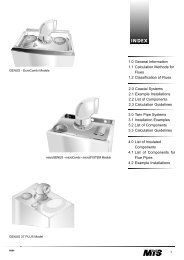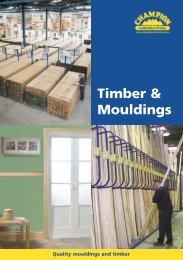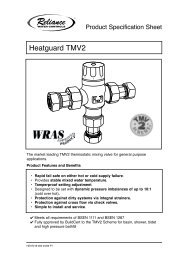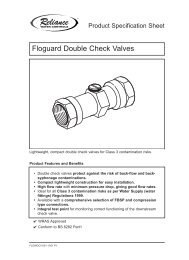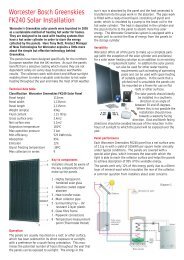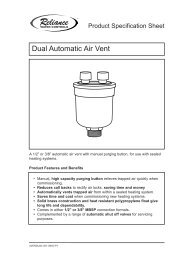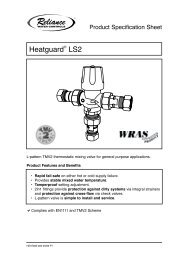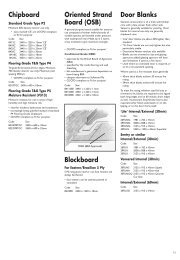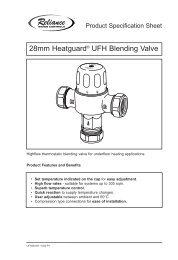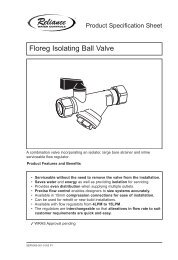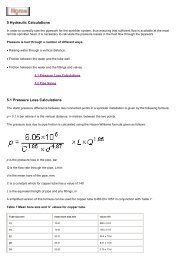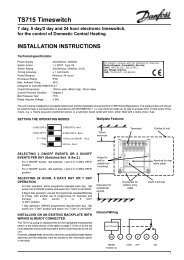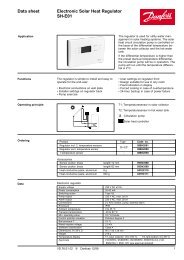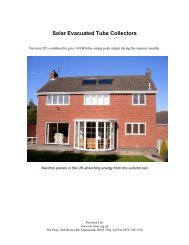Documentation - Heatweb
Documentation - Heatweb
Documentation - Heatweb
Create successful ePaper yourself
Turn your PDF publications into a flip-book with our unique Google optimized e-Paper software.
ABOUT THE SYSTEM<br />
CXC-200-DUBLIN<br />
The Dublin Heat Bank has been designed to meet local authority requirements for a hot water system<br />
that is more efficient and cheaper to run than current installations.<br />
The aim of the design has been to maximise the efficiency of all thermal technologies that can be<br />
retro-fitted to properties, to reduce maintenance requirements, and to improve reliability by taking<br />
an existing combination boiler installation and adding facilities for flue heat recovery from the gas<br />
boiler, solar panels, a wood burner, and backup electric.<br />
The advantages of adding the technologies using the Dublin Heat Bank are as follows:<br />
1. Flue Heat Recovery systems can significantly improve the efficiency of a condensing boiler, and<br />
if connected to a suitably sized store will provide hot water during the heating season, using<br />
the recovered heat from the flue gases.<br />
2. Solar panels can connect directly to the Dublin Heat Bank to provide up to 50% of the<br />
households annual hot water requirements, with up to 100% of daily requirements on sunny<br />
days. The system uses a unique direct connection method along with drain-down protection<br />
that overcomes problems relating to freezing or overheat, and also removes the need for antifreeze<br />
and regular maintenance to maintain system pressure and anti-freeze content. The<br />
direct connection is also more efficient than using solar coils, and allows connection to very<br />
large solar arrays as well as individual panels.<br />
3. Wood burners can be connected directly to the Dublin Heat Bank using two connections<br />
provided as standard. This allows the wood burner to supplement both central heating and hot<br />
water, and can significantly reduce running costs and the carbon footprint of the property.<br />
Combined with a local supply of free wood, this method of heating can provide low cost hot<br />
water and heating during winter months,<br />
4. The pre-heat system that the Dublin Heat Bank employs uses stored energy to heat up water for<br />
domestic use. If the heated water is not quite hot enough for domestic use then it is fed through<br />
the combination boiler to be topped up to a suitable temperature. This method ensures that a<br />
minimum amount of gas is used, and the boiler is never used to heat stored water that may be<br />
left to go cold, or could otherwise have been heated using a free energy source.<br />
5. Electric backup to hot water is provided by an optionally fitted immersion heater in the Dublin<br />
Heat Bank. This adds an important backup feature that allows the user to run hot water on<br />
electricity if the boiler should fail to fire. It also allows the possibility of connecting a wind turbine<br />
or other low cost electrical source to further reduce running costs.<br />
6. Heat Pumps are another low temperature heat source that is often too low in temperature to<br />
provide adequate hot water. When used in conjunction with the Dublin Heat Bank, heat pumps<br />
can generate the majority of the stored energy using cheap rate overnight electricity, and this<br />
can then be topped up for use by the combination boiler.<br />
7. Legionella is a common problem in the supply of domestic hot water, and protecting against it<br />
is of key importance. The Dublin Heat Bank heats water instantaneously as it is used, and the<br />
stored water is not used to supply taps. No hot domestic water is stored and there is no chance<br />
of Legionella bacteria growing as can happen in stored hot water systems.<br />
8. Up to 9 bar cold supply pressures can be accommodated, with up to 6 bar pressure supplied to<br />
hot taps (boiler dependent), and all using a vented storage cylinder that can be fitted without<br />
unvented qualifications. In this way mains pressure systems can be installed using existing<br />
installer networks, even if they do not hold the additional qualifications for installing pressurised<br />
cylinders.<br />
9. Long term reliability is achieved by the use of a high grade stainless steel store combined with<br />
the thermal storage principle that prevents the store from attack by fresh ingress of water. All<br />
systems come with a 25 year guarantee on the store, and it is believed that the store should last<br />
considerably longer.



